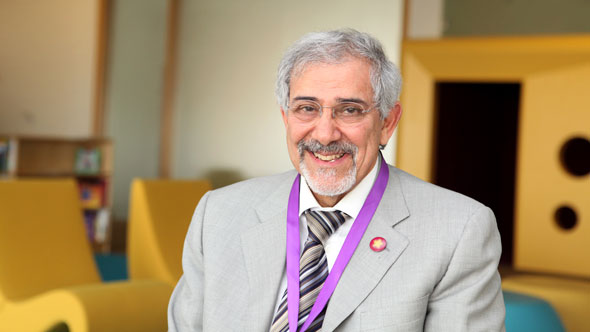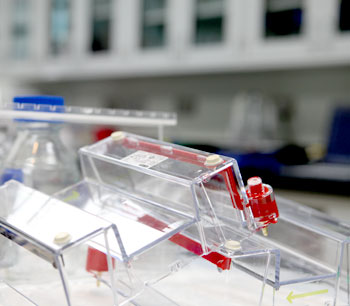Healthcare in Kuwait | Assessment by Former Minister of Health
Interview with Dr. Hilal Al-Sayer, President of Bayt Abdullah Children’s Hospice and Former Minister of Health of Kuwait. All Kuwaiti nationals receive free healthcare. Dr. Al-Sayer says there are many opportunities to invest in healthcare system of Kuwait. At the moment the private healthcare is blooming in Kuwait. It is a trend in Kuwait to seek a medical treatment within the private healthcare sector.

What do you identify as challenges facing the healthcare sector in Kuwait? What kind of reform would you like to see?
When I first became a Minister of Health of Kuwait, I asked the Prime Minister what his main problem was in Kuwait. He said it was treatment abroad, as this phenomenon takes a big chunk of Kuwaiti budget. The reason why people went to seek treatment abroad wasn’t a lack of expertise, but a sort of trend at the time, started off by MPs. MPs would offer benefits to citizens in their constituencies in the form of funding for treatment abroad in order to gain popularity.
I set up committees of experts in hospitals, and a higher committee to supervise them. These committees evaluated patients and decided whether treatment was available in Kuwait or not, which decreased treatment abroad. We also brought foreign experts from Canada, the US and UK to Kuwait – not only to treat, which does not solve the problem – but train our doctors. The Canadians from McGill University were sent to the chest hospital (cardiovascular diseases), and the experts from Toronto were sent to the Cancer Centre. These two were the main areas in which people used to seek treatment abroad.
The second challenge was doctor training for higher quality service. We made contracts with Canadian universities to send our doctors there. Another problem was to do with accreditation for our hospitals and medical departments in Kuwait. Again, the Canadian Accreditation Board was our partner in improving this. We had a lot of our institutions accredited for good standards.
I also set up the Kuwait Health Authority, in charge of insurance services for Kuwaitis, IT, public health, licensing of the private sector, accreditation and treatment abroad. These were all burdens off the Ministry of Health’s responsibilities. It could now concentrate on clinical matters. This was all part of the Reform Plan. Since I left the Ministry of Health, a lot of these challenges have been tackled.
When you project yourself in the future, looking at current trends, do you think healthcare is a main challenge in the development of Kuwait?
Of course. Any service improving the lives of nationals is of high importance. Our constitution states that all nationals should receive free healthcare. We are very proud of the National Healthcare System, which is a bit like the UK’s National Healthcare System – everything is free of charge. It’s a very good system. Once the insurance system was sorted, a lot of problems were solved in the healthcare area. The Kuwaiti Health Authority played an important role in improving quality standards, as it monitored and assessed the measures taken by the Ministry of Health. Because it wouldn’t be right for the Ministry of Health to create services and evaluate these services. This is a major step of the Reform. The law has already been written, it only needs to be approved in Parliament and then it will be implemented.
There are good investment opportunities within the private sector… The healthcare private sector is blooming in Kuwait.
What are the investment opportunities in the healthcare sector? What should investors be weary of when considering investing in the healthcare sector? What are the challenges?
There are good opportunities within the private sector, in many areas where the National Healthcare System has not yet achieved good standards. The private sector is complementary – just like anywhere else in the world. The healthcare private sector is blooming in Kuwait. People like to seek treatment within the private sector and benefit from a more customer-oriented service, have a nicer room etc. Investment in healthcare is a big market.
In summary, what do people need to know about the Kuwait healthcare system?
First of all, the Kuwaiti National Healthcare System is a free service for everybody, which I believe should be done in any country that can afford it. We have over 100 primary healthcare clinics, which means nationals can reach a private clinic within 15 minutes from his/her home. If s/he needs secondary healthcare, hospitals are also within a 15 minute reach of any point in the country. In terms of tertiary healthcare, we have the Al-Sabah Complex, a medical city that provides all tertiary healthcare services in one same area. These are the three areas in which Kuwait excels. A lot of tertiary healthcare services (ophthalmology, neo-natal, ENT, paediatrics, vaccination etc) are also provided in primary healthcare clinics.
Can you tell us about Bayt Abdullah Children’s Hospice?
Palliative care is not taught in medical schools, it’s a new specialty. This is why we have established Bayt Abdullah Children’s Hospice only for children – there is another palliative care service for adults under the responsibility of the Ministry of Health of Kuwait, which was launched very recently. We at Bayt Abdullah opened in 2006. It was felt that such a service needed to be established for children suffering terminal diseases. It was also important to raise awareness on this, which we have been doing. Bayt Abdullah Children’s Hospice is complementary to the Ministry of Health in the sense that we take care of patients that are under their responsibility, free of charge. We work in very good partnership with the Ministry.